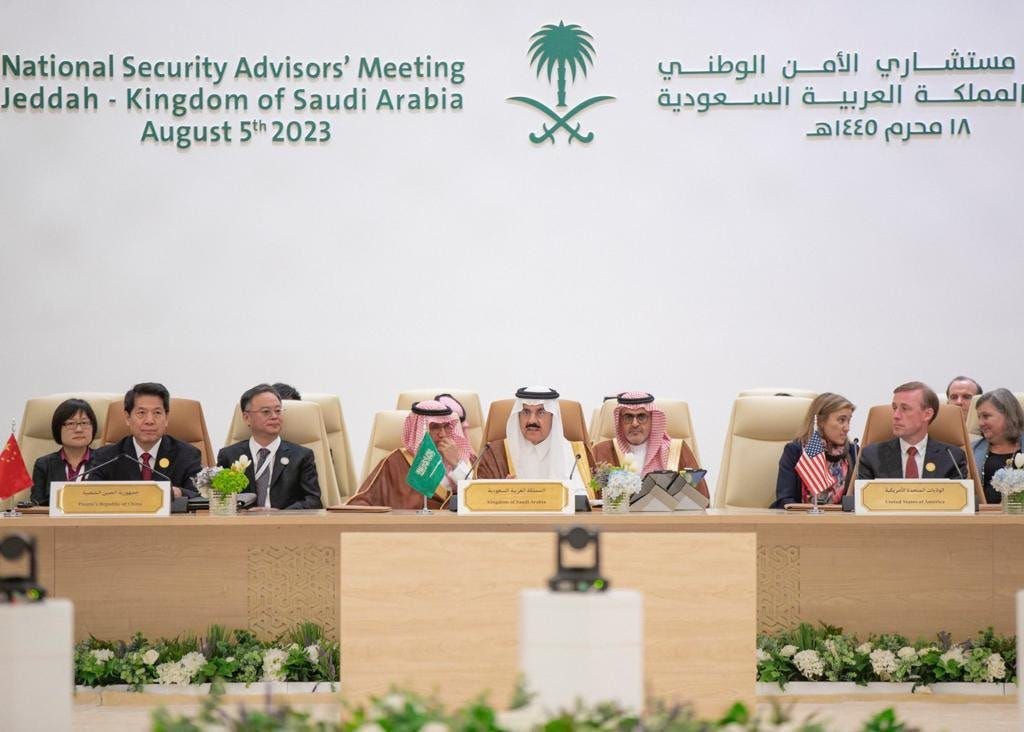U.S. rebuts reports of preliminary deal to advance Saudi-Israel normalization
“The bottom line is: there’s no agreed-to…framework to codify normalization or any of the other security considerations that we and our friends have in the region,” the NSC’s John Kirby said Aug. 9.

Both the White House and State Department pushed back against a Wall Street Journal report today that said the United States and Saudi Arabia had reached a broad framework deal to support Israeli-Saudi normalization, with many details to be worked out over the next several months. But the report seemed to reflect the comments U.S. National Security Council officials involved in the discussions have recently made to interlocutors following meetings with Saudi Crown Prince Mohammed bin Salman and other Saudi officials in recent weeks.
“Quite frankly, just to be blunt here, I think the reporting has left some people with the impression that the discussions are farther along and closer to some sense of certainty than they actually are,” the NSC’s John Kirby told journalists on a virtual gaggle today (Aug. 9).
“The bottom line is: there’s no agreed to set of negotiations, there’s no agreed-to framework, to codify normalization or any of the other security considerations that we and our friends have in the region,” Kirby said.
“The U.S. and Saudi Arabia have agreed on the broad counters of a deal for Saudi Arabia to recognize Israel in exchange for concessions to the Palestinians, U.S. security guarantees and civilian nuclear help, according to U.S. officials,” the Wall Street Journal reported. “U.S. officials expressed cautious optimism that, in the next nine to 12 months, they can hammer out the finer details of what would be the most momentous Middle East peace deal in a generation. But they warned that they face long odds.”
The State Department said the reports “vastly overstate” where discussions stand.
“I think the reports that we have reached some sort of agreement vastly overstate where things stand,” State Department spokesman Matt Miller told journalists at the State Department briefing today.
“I will say that we've had productive conversations,” Miller later said. “There's a number of issues that we have discussed both with the Israeli government and with the Saudi government. Those conversations continue.
“I expect there will be more happening in coming weeks,” Miller continued. “We’ve made progress on a number of issues. I'm not going to get into what the progress is, but it is still a long road to go with an uncertain future. But it is an important initiative that we think we should continue to pursue.”
“From our perspective, the purpose of this [potential] agreement is to increase stability in the region and to normalize relations between the two countries,” he said. “Potential agreement. I think I'd made clear we don't have an agreement” yet.
The NSC’s Kirby said President Biden had authorized his national security team to travel to the region to pursue discussions on “what was in the realm of the possible.” Those discussions are continuing, he said.
The President was approving of an effort by National Security Advisor Jake Sullivan, NSC Middle East coordinator Brett McGurk, and energy advisor Amos Hochstein “to travel to the region and to see what was in the realm of the possible when it comes to pursuing Israel-Saudi normalization,” Kirby said.
But, he added, “normalization, and any sort of agreement towards normalization-- that’s going to be decided by those two sovereign states.” Regarding potential US “incentives” to get the parties there, “all I would tell you is that those discussions are ongoing,” Kirby said.
I reported last week that some U.S. officials came away more optimistic from a July 27 meeting “between Sullivan and Saudi Crown Prince Mohammed bin Salman (MBS) on a possible framework for Israel-Saudi normalization, U.S. and Saudi sources said. But, U.S. sources cautioned, this is a complex process with a lot of moving parts, and they still have a way to go. In addition, US President Joe Biden is still not thought to have decided if he thinks the initiative is viable.”
Some White House officials believe that Saudi Crown Prince Mohammed bin Salman ‘has made a strategic decision to go for Israel normalization while Biden is in office, mainly because he understands that he only gets what he wants with a Democratic president,’ a Saudi expert source, speaking not for attribution, said in an interview (Aug.4). ‘U.S. officials say now that he’s bought into it. The goal is to try to get a deal done by the first quarter of 2024.’
[…]
While Biden himself is apparently not yet sold on the prospective deal, US and Saudi sources said there had been progress in talks last week between the Sullivan and MBS teams.
The Saudi expert source said Sullivan returned from meeting MBS July 27 last week with a framework of what would be the U.S. elements of such a normalization deal. Those four elements, he said, are: a security guarantee for Saudi Arabia (not a NATO-type Article V treaty pact, he said, but something described as a ‘major non-NATO ally plus plus’ agreement). “It’s like an MNNA plus plus, but no Article V,” the Saudi source said.
The second element is nuclear tech. Third is reliability on U.S. weapons sales to Saudi Arabia. The fourth element involves China, with the U.S. seeking firewalls between U.S. and China military technology employed by Saudi Arabia.
Axios’ Barak Ravid reports today that Israeli Prime Minister Benjamin Netanyahu would also like to get a security guarantee from the U.S. administration as one of the U.S. inducements for Israeli-Saudi normalization. “Netanyahu told Biden he wants to send his confidant and Strategic Affairs Minister Ron Dermer to Washington to present a proposal in detail,” Axios reported.
The White House repeated today that Biden plans to meet Netanyahu somewhere in the United States this fall, but said the details are still being worked out.
**


